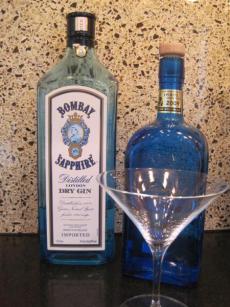
Gin is a family of distilled spirits first invented in the late 16th century by Dutch physician Sylvius de Bouve, who began flavoring barley malt spirits with botanicals like juniper, coriander, caraway, and anise in order to treat kidney and stomach complaints, gallstones and gout. Gin, which was also called genever, jenever, genièvre or even geneva, is so named for the inclusion of the juniper berry (juniperus communis), an evergreen shrub with a wide range of growth in the cool climate of the northern hemisphere. Juniper berries have a high percentage of pinene as an aroma chemical, which gives both the berry and the gin flavored with juniper its distinctive pine aroma. This aroma and flavor is what separates gin from other flavored spirits.
With the accession of the staadtholder (ruler of the Dutch Republic) William of Orange to the throne of England following the Glorious Revolution of 1688, gin, which had developed a loyal following among the English military (who had been fighting the Spanish in Holland), began to grow in popularity. When England decided to tax imported alcohol by volume rather than alcoholic strength, production exploded. By 1740, six times more gin was produced in England than beer. Gin became the drink of choice for the poor, as it was inexpensive. Adulteration of the spirit became common, with turpentine being the additive of choice. Gin began to be blamed in the press for societal ills, and in response, the government introduced the Gin Act of 1751, which forced producers to sell their spirit only to licensed retailers.
With the introduction of the column (or continuous) still in 1832, cleaner, lighter neutral spirits could be produced. This led to a new style of gin called London Dry, which was much less sweet than the Dutch style, and heavily flavored with juniper. In between those two styles, a hybrid called Old Tom gin was invented, but the recipes were considered lost until recently.
Today, there are five main styles of gin:
- Genever -- the original style of gin, which is malty-sweet, low in juniper, and can be either Jonge ("modern" styled, lighter, less malty) or [ingredient=oude-genever Oude] (traditionally made, heavier, malty)
- [ingredient=old-tom-gin Old Tom gin] -- a hybrid style with less malty sweetness than Genever, but some of the juniper punch of London Dry. These are becoming more popular with the rise of craft cocktails, and Hayman's is one example.
- London Dry gin -- Clear, very dry, aggressively juniper flavored. The most common style of gin today. Bombay, Tanqueray, and Boodles all make London Dry gins. They can contain no sugar or colorants.
- Plymouth gin -- A type made in the city of Plymouth. Like London Dry, but softer, with less emphasis on juniper and more earthy flavors. Plymouth is one example of true Plymouth gin, but Bluecoat makes a Plymouth-style gin.
- Modern/Atypical gin -- Cleaner and lighter styles, or gins flavored with atypical botanicals, like rose or cucumber. Hendrick's, Citadelle, [ingredient=smalls Small's] and Cadenhead's Old Raj are good examples.
[ingredient=sloe-gin Sloe gin] is a type of gin flavored with the sloe, a type of plum.
Gin is one of the foundations of cocktails. As one of the few clear spirits available to the modern bartender (along with white rum), gin is used in thousands of cocktails. It's terpenaceous aroma and flavor make it a natural pair for both grapefruit juice and tonic water. Most gins are bottled between 75 and 120 proof, with 80 being the standard.
Some popular cocktails containing Gin
- First Rodeo — Gin, Bianco Vermouth, Peychaud's Bitters, Grapefruit juice, Soda water, Simple syrup, Lemon juice, Orange peel
- The Lady Chesdin — Gin, Dry vermouth, Orange bitters, Peychaud's Bitters, Bitters, Celery bitters, Cucumber, Onion, Sugar cube, Lime
- Padded Thai — Gin, Cynar, Ginger liqueur, Drinking vinegar
- My Dear Quarantine — Gin, Pear liqueur, Soda water, Lemon juice, Orange juice, Simple syrup, Lemon peel, Cardamom
- Steppin' Out — Gin, Palo Cortado Sherry, Dry vermouth, Crème de Banane, Lemon peel
- Pixie Fingers — Gin, Tonic water, Lemon juice, Lime juice, Agave syrup, Rosemary, Lemon
- (Beware the) Pink Slip — Ginger liqueur, Gin, Dry vermouth, Absinthe Rouge, Lime, Honey
- Cansiglio Bianco Negroni — Gin, Bianco Vermouth, Herbal liqueur, Lemon
- Amber Room Cocktail — Gin, Amber vermouth, Elderflower liqueur, Bitters, Orange peel
- Menorcan Sherry-Ferry — Gin, Valdespino Jerez Quina, Cappelletti Aperitivo, Bitters